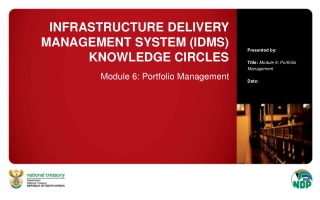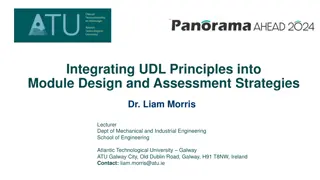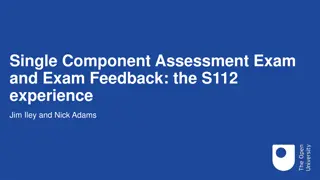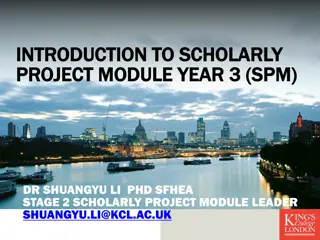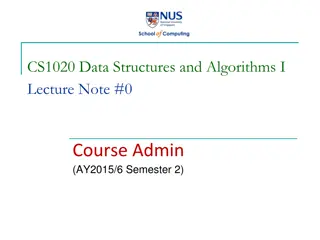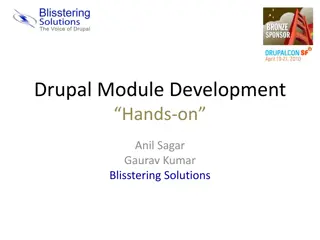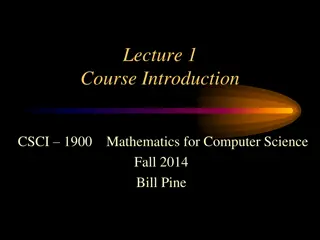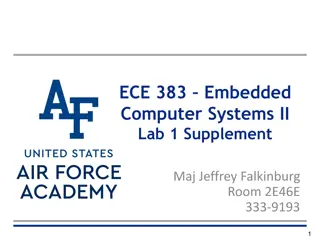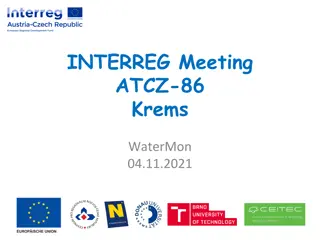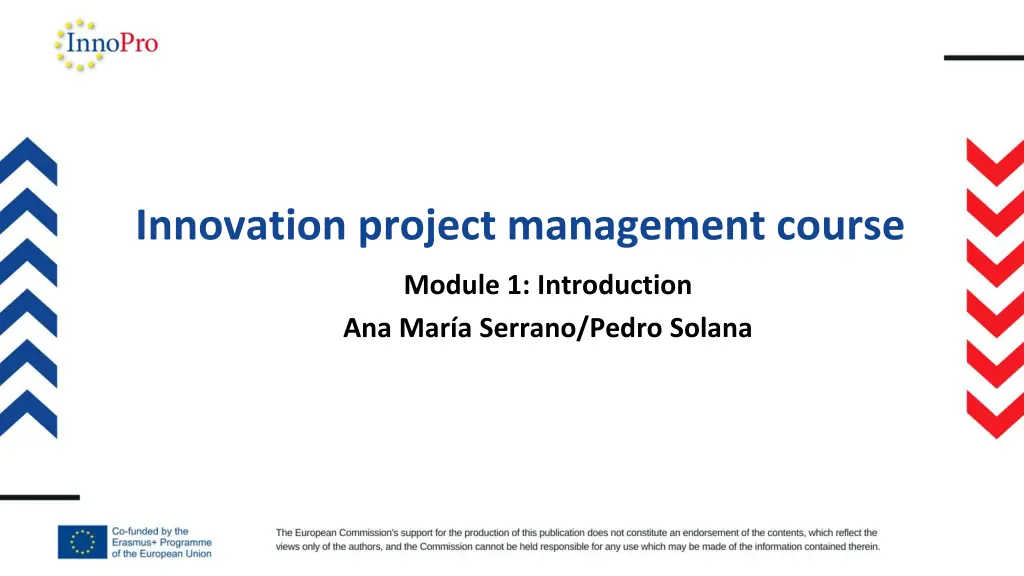
Innovation Project Management Course: Introduction and Objectives
Explore the fundamentals of innovation project management in this course module. Gain theoretical knowledge and practical skills to navigate the complexities of innovation processes. Enhance competences in innovation management and project execution. Develop a solid understanding of key concepts and practices for successful innovation project implementation.
Download Presentation

Please find below an Image/Link to download the presentation.
The content on the website is provided AS IS for your information and personal use only. It may not be sold, licensed, or shared on other websites without obtaining consent from the author. If you encounter any issues during the download, it is possible that the publisher has removed the file from their server.
You are allowed to download the files provided on this website for personal or commercial use, subject to the condition that they are used lawfully. All files are the property of their respective owners.
The content on the website is provided AS IS for your information and personal use only. It may not be sold, licensed, or shared on other websites without obtaining consent from the author.
E N D
Presentation Transcript
Innovation project management course Module 1: Introduction Ana Mar a Serrano/Pedro Solana
Introduction Module Description This module aims to provide the introduction to the InnoPRo Course. The approach of the course is based on a project cycle methodology applied to the preparation and management of innovation projects, the AIDIC (Assessment-Initiation-Design-Implementation-Closure) model. It also includes an introduction to the essence of innovation management.
Introduction Objectives o Acquire theoretical knowledge as well as practical skills to deal with key issues and decisions associated with innovations o Acquire competences associated with the process of innovation management. Learning Outcomes o Students are familiarised with the concepts of innovation, innovation process and Innovation Management Systems. o Students receive adaptable guidance for managing innovation processes. o Students are able to actively use common terms related to innovation and project management concepts. o Students achieve competence and skills related to key activities involved in innovation processes and their application in the framework of project management. o Students increase their level of understanding of conceptual foundations of innovation. o Students improve on their understanding of innovation as a process involving different activities within the framework of project management o Students receive adaptable guidance for implementing an innovation management system in an organisation
Introduction Module Structure The module presents the motivation behind the course as well as its general description and structure. In addition, key topics of innovation management are described for the sake of successful implementation of innovation projects. The background theory is set and current practices of innovation management defined.
Mainobjective COURSE INTRODUCTION Develop relevant and high-quality competences related to the preparation and management of innovation projects with the use of innovative teaching methods, tools and innovative up to date content. Sub-objectives Facilitate international cooperation and best practice exchange among universities and companies. Develop students practical skills demanded by the labour market and R&D sector. Support teachers and lecturers competence in interactive training. Promote lifelong learning in order to increase employability. Incorporate the latest methods and tools Enable self-study and education to everyone.
Course motivation COURSE INTRODUCTIO N Enhance profesional competences of the target groups participating in the course in the area of Project and Innovation Management. Improve management skills (critical thinking, decision- making, planning, oral and written communication). Prepare universities/research industry/companies. students future career at centres and in the
The Module 1: Introduction to Innovation Management explains what innovation is and provides an analysis of the innovation process by describing how it occurs and what its outcomes are. INTRODUCTIO N TO INNOVATION MANAGEMENT Innovation. Concept and Process: Theoretical Basis
Conceptual foundations: Schumpeter, Theory of Evolutionary Economics. Five types of new combinations: 1.- The introduction of a new good or of a new quality of a good. 2.- The introduction of a new method of production 3.- The opening of a new market 4.-The conquest of a new source of supply of raw materials or half- manufactured goods 5.- The carrying out of the new organization of any industry. INTRODUCTIO N TO INNOVATION MANAGEMENT The Oslo Manual: four editions. The 4th edition distinguishes: Innovation (outcome): a new or improved product or process (or combination thereof) that differs significantly from the unit s previous products or processes and that has been made available to potential users (product) or brought into use by the unit (process) (OECD/Eurostat, 2018, p. 60). Innovation process: all developmental, financial and commercial activities undertaken by a firm that are intended to result in an innovation for the firm (OECD/Eurostat, 2018, p. 33).
Research activities. and experimental development (R&D) Engineering, design and other creative work activities. Marketing and brand equity activities. INTRODUCTIO N TO INNOVATION MANAGEMENT Innovation process activities IP-related activities. Employee training activities. Software development and database activities. Activities related to the acquisition or lease of tangible assets. Innovation management activities.
COURSE INTRODUCTIO N Innovation Management Systems: Theoretical Basis
COURSE INTRODUCTIO N Innovation Management: all systematic activities to plan, govern and control internal and external resources for innovation. This includes how resources for innovation are allocated, the organisation of responsibilities and decision-making among employees, the management of collaboration with external partners, the integration of external inputs into a firm s innovation activities, and activities to monitor the results of innovation and to support learning from experience (OECD/Eurostat, 2018, p. 91).
COURSE INTRODUCTIO N Standars for the Innovation Management: ISO 56000: 2020, Innovation management Fundamentals and vocabulary ISO 56002:2019, Innovation management Innovation management system Guidance ISO TR 56004: 2019, Innovation management assessment Guidance ISO 56003: 2019, Innovation management Tools and methods for innovation partnership Guidance It also has several standards in development, including: ISO 56005, Innovation management Tools and methods for intellectual property management Guidance ISO 56006, Innovation management management Guidance ISO 56007, Innovation management Idea management ISO 56008, Innovation management Tools and methods for innovation operation measurements Guidance Strategic intelligence
Innovation Management System: provides a common framework to develop and deply innovation capabilities, evaluate performance, and achieve intended outcomes. COURSE INTRODUCTION Innovation management system implementation: Commitment by top management Ability of leaders to promote innovation capabilities Culture supporting innovation activities Managed through well-defined projects. Following ISO 21500: 2012, a project is defined as a unique set of processes consisting of coordinated and controlled activities with start and end dates, performed to achieve project objectives while project management is the application of methods, tools, techniques and competencies to a project.
COURSE INTRODUCTION Innovation management ISO 56002: 2019. Seven key elements Figure Representation of the framework of the innovation management system with references to the clauses of ISO 56002. Source: ISO, 2019
THANK YOU FOR YOUR ATTENTION

